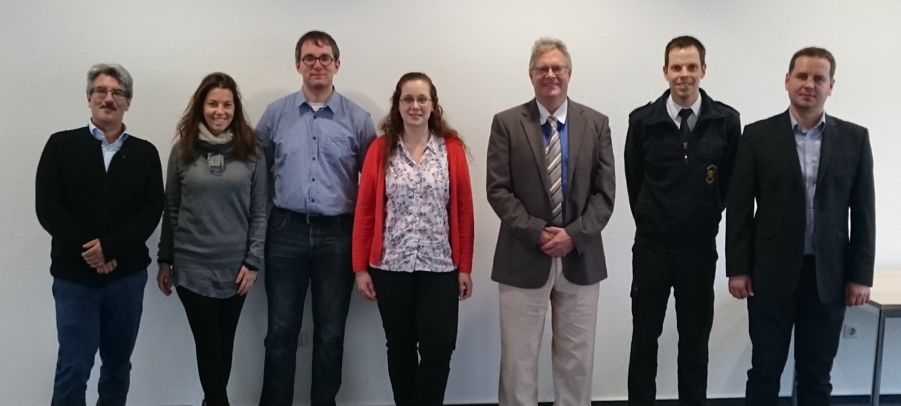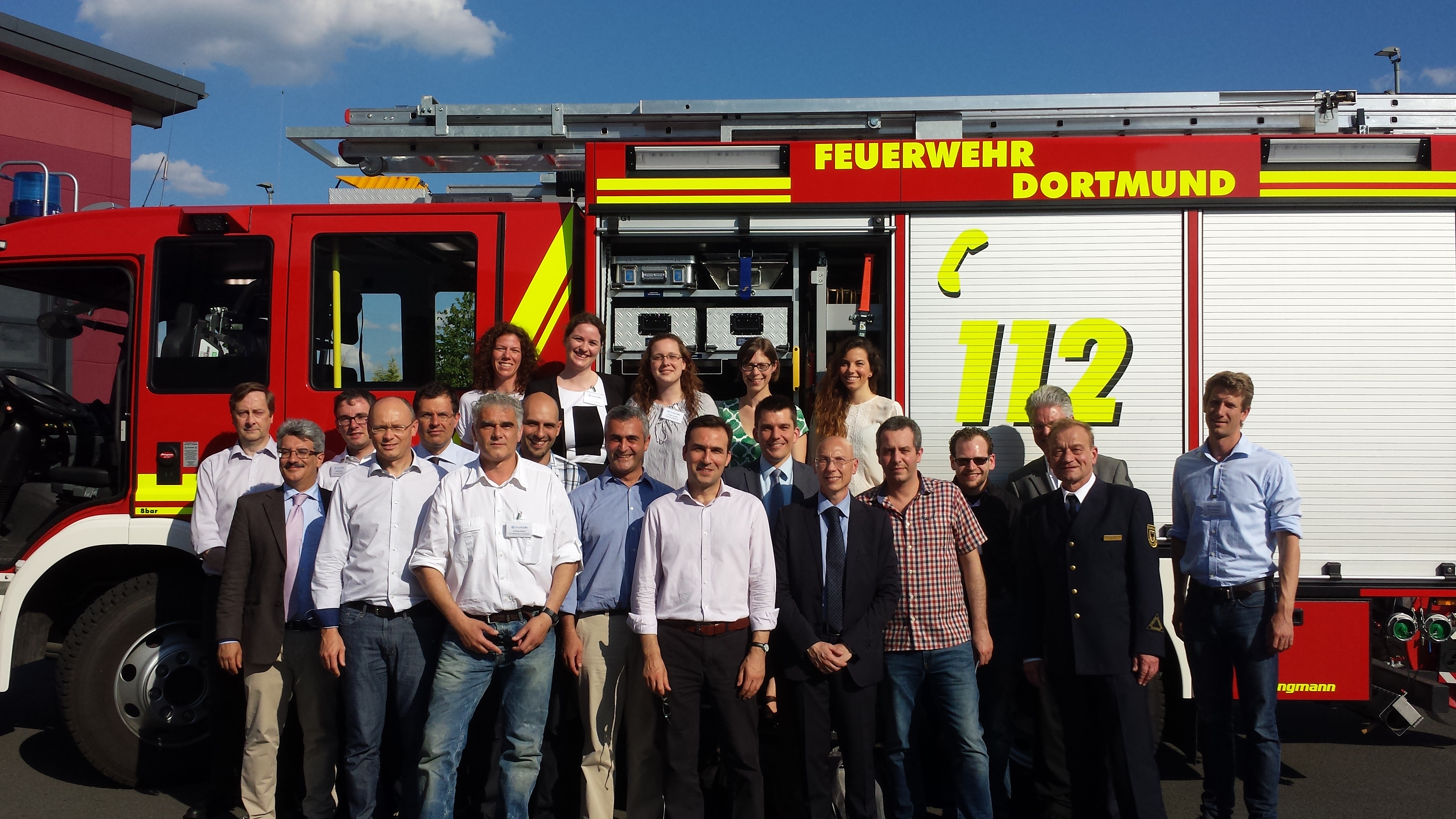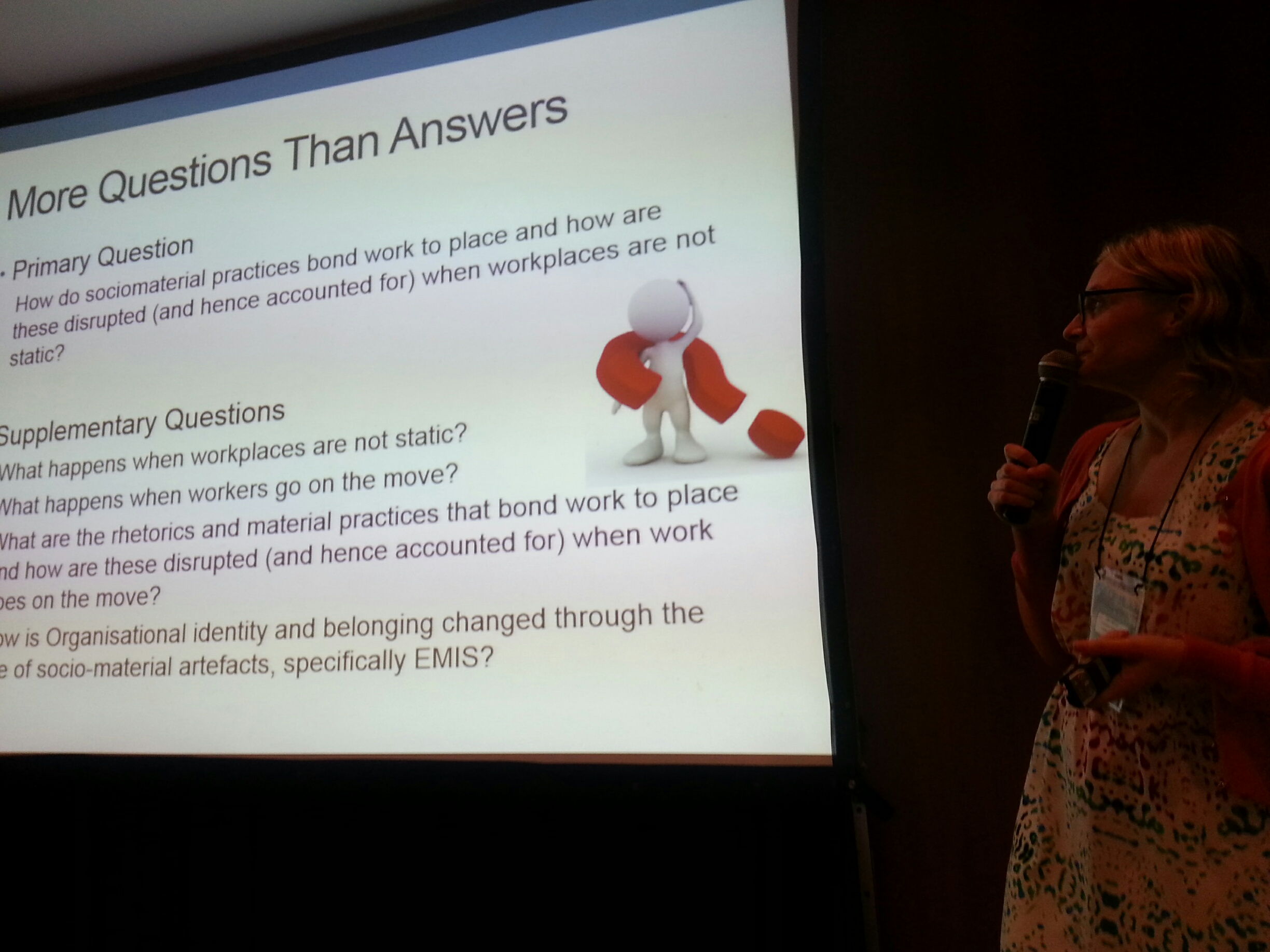Together with FP7-projects EPISECC and SECTOR SecInCoRe attented at the Standards4EU CWA kickoff meeting. Terminologies in crisis as well as disaster management were the main topics of this event hosted by CEN.
SecInCoRe participated in a joint event with FP7-projects EPISECC, SECTOR and ReDIRNET. Christina Schäfer presented the SecInCoRe CIS concept (see picture below). SecInCoRe as well as the other projects got a lot of excellent feedback through the expert discussions revolving this joint event. This underlines the excellent possibilities joint events bring to the success of projects and SecInCoRe thanks all parties involved!


The advisory board of SecInCoRe came together in Manchester to reflect the outcomes of the Common Information Space and the CIS concept. It has been an intense meeting with very deep impressions of the CIS concept. We thank every partner involved for their participation and feedback and hope to continue the good work.

On January 3rd 2017, a validation activity has been organised with a representative of the Italian Civil Protection. The end user was introduced to SecInCoRe concepts and outputs through a combination of conceptual presentations and practical interactions with the SecInCoRe demonstrator. The aim was the collection of feedback on the components identified as targets for validation activities: CIS concept; Collaborative practices; Taxonomy/Ontology and Semantic Search and Knowledge Base/Inventory. The Demonstration Case was organised according to the established methodology and all results will be reported in the final Report on Validation and Evaluation, D5.5. We were glad to collaborate with the Italian Civil Protection.
According to the timeline for validation activities, and following the Demonstration Case organised in Paderborn (25 October 2016), a validation activity has been organised in Rome on 15 December 2016. The aim of the Demonstration Case was to validate SecInCoRe components engaging a representative of the Italian Fire Brigades. Thanks to the end user’s direct experience in the whole process of the crisis management cycle and his understanding of similar technological systems for the emergency, it was possible to validate SecInCoRe’s components (CIS concept; Collaborative practices; Taxonomy/Ontology and Semantic Search and Knowledge Base/Inventory) trough the interaction of the end user with the demonstrator. A dedicated report of the activity will be inserted in D5.5. It was a pleasure to run a validation activity with a representative of Italian Fire Brigades.
On 25th of October 2016 SecInCoRe Team members engaged with international practitioners to demonstrate SecInCoRe concepts and reference implementations in Paderborn. In addition, validation exercises took pace during the workshop. We were glad to welcome a member of the CNBOP from Poland, a member of the Fire Brigade in Paderborn and moreover a member of the Dortmund Fire Brigade who is also a member of our Advisory Board.
In the last Plenary Meeting SecInCoRe set up the plan for the last half year of the project. The last period will feature a final workshop with the Advisory Board and furthermore a Joint Event with all other projects funded under FP7-SEC-5.1.1. The team is highly motivated to conclude the SecInCoRe project with great success after the great results it got to this point!
The workshop consisted of collaborative exploration and experimentation with the concept and reference implementations for the semantic framework and knowledge base. It brought together representatives from all partners in SecInCoRe and two representatives from the Lancashire Local Resilience Forum with whom we’ve had long-term interactions. The workshop covered:
- the overall project concept
- details about the search, semantic framework, and knowledge base
- time to explore the reference implementations of these aspects
- discussions around how different forms of transparency could support the design and use of these aspects of the project
- and a debate about structuring the knowledge base as a library or a catalogue.
Overall, the discussions brought together the various perspectives of those involved in ways that lead to new insights about the potential of SecInCoRe. By the end of the workshop, most, if not all, involved found themselves thinking differently about an aspect of the design than before the workshop. Part of this was because of the ability to have something concrete and hands-on to interact around. Part of this was because the workshop was not set up to be designers versus users, but mixed everyone together.
While we all agreed that the reference implementation of the search still needs work to act as a marketing tool, it provided a fantastic opportunity to explore how our concept pairs with design. Doing so helped the project partners in SecInCoRe focus their follow up discussion on how to better demonstrate the overall holistic concept as well as what to focus on within each reference implementation to best show the value and state of the art aspects of the concepts.
Key Points:
- While we are not focusing on interfaces, we need to think critically about how to demonstrate the complex state of the art underlying engineering and design that we are developing.
- The individual emergency responder “user” is not our audience. Rather, because of the level of design and concept, we are more focused on the strategic planners within organisation and institutions.
- A library and catalogue structure for the knowledge base have relatively equal problems and advantages technologically. However, they do offer different social opportunities, which need to be considered to a greater degree.
- Even if imperfect, having some meta-data produced in advance that can then be edited would likely create situations of greater equivalence in entries and more likely encourage user interventions to produce better meta-data overall than having a blank slate which the user is the only source of entry. With that said, having only computer-generated meta-data will not work either.
The second review meeting of the SecInCoRe project took place from 23th to 24th of June in Dortmund. All scheduled deliverables were submitted and significant results in terms of deliverables and scientific publications were published (especially with a strong contribution at ISCRAM 2016). In Dortmund the consortium presented outcomes and the current status also based on Lancaster workshop results. Especially collaboration and use of the demonstrator by invited participants of the fire department of Dortmund was shown on the first day. Besides presentations of all work packages TU Dortmund had presented the laboratory in order to demonstrate the work regarding the SecInCoRe CIS component “Network Enabled Communication system concept”.

The 13th International Conference on Information Systems for Crisis Response and Management (ISCRAM) took place in May in Rio de Janeiro. This drew together an international delegation showcasing cutting-edge research on current practices and future predictions for crisis and disaster management. The SecInCoRe team, along with Dr Lisa Wood from Lancaster University, organised and chaired a track on the Ethical, Legal and Social Issues (ELSI) inherent in technology development for crisis management. The track included a diverse, yet linked, spread of presentations on issues such as organisational identity, trust, IT frameworks, limited English populations, community engagement, and employing a normative multi-agent system. From SecInCoRe, Professor Monika Buscher presented on-going work on the development of ELSI guidelines, Dr Katrina Petersen outlined research into ethical impact assessments, and Dr Catherine Easton spoke on the impact of the EU Data Protection Regulation on crisis IT development. The sessions spurred a wide range of discussions and the SecInCoRe work on ELSI engendered a high level of interest from this international, expert audience.









